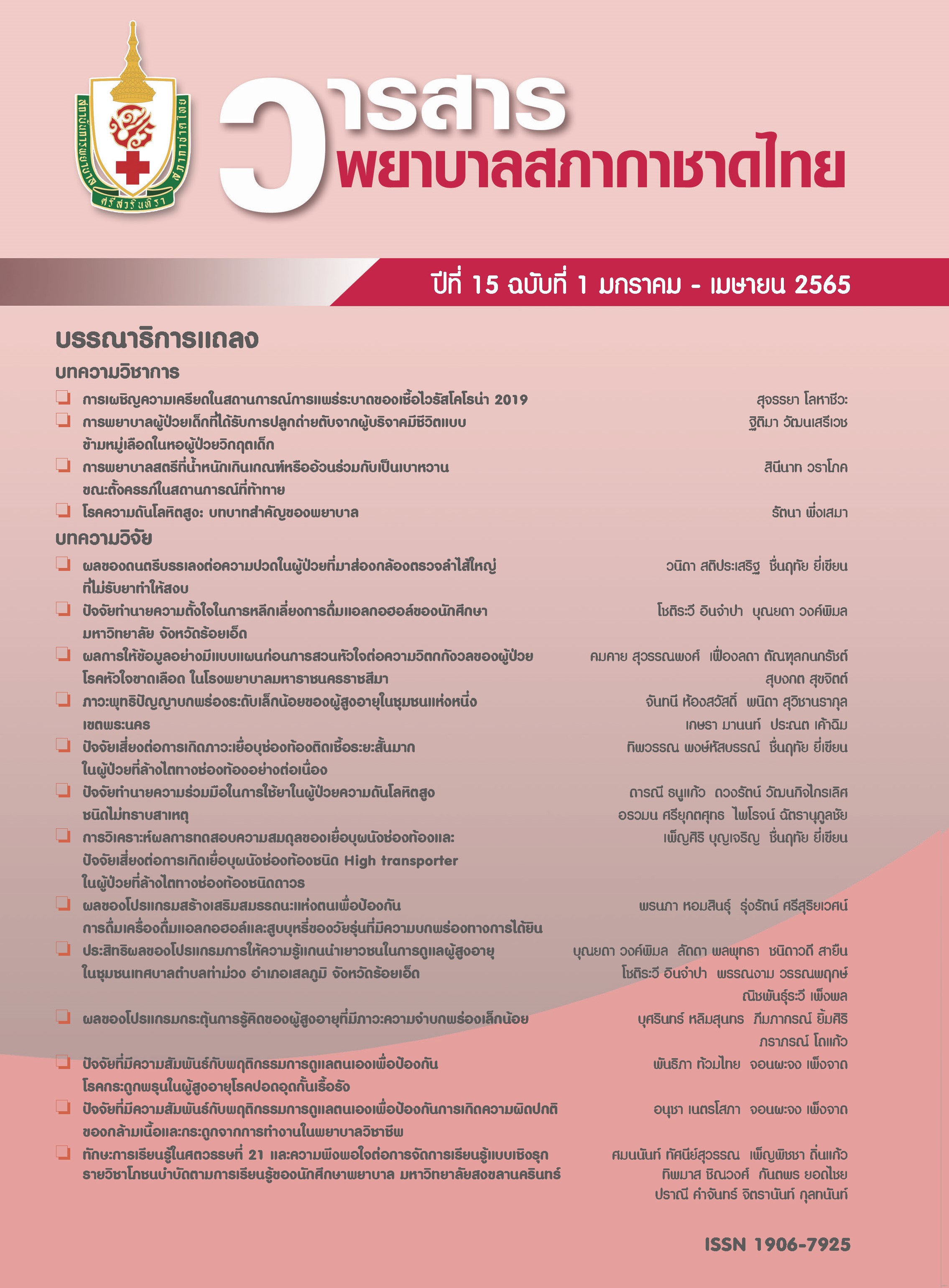Factors Predicting Medication Adherence in Patients with Essential Hypertension
Keywords:
essential hypertension, medication adherence, medication regimen complexity, health literacyAbstract
This cross-sectional study aimed to explore factors predicting medication adherence among patients with essential hypertension. The subjects consisted of 225 patients with essential hypertension, aged eighteen-year-olds or above, who were. self- medicating for at least six months, and treated at an outpatient department in a tertiary hospital in Bangkok. Data were collected by questionnaires and analyzed using descriptive statistics and logistic regression analysis.
The results revealed that of thesd respondents, 60% were female, the mean age was 68 (SD = 10.23), 80% of essential hypertension indicated medication adherence. Income sufficiency, health coverage, medication regimen complexity, the severity of the disease, and health literacy were co-pre predict medication adherence among patients with essential hypertension at 29.6% (R² = .296). Income sufficiency, medication regimen complexity and health literacy were able to predict medication adherence with statistical significance (OR = 3.86, 95% CI= 1.31 – 11.35, OR = 2.86, 95% CI = 1.28 - 6.38 and OR= 5.62, 95% CI = 1.61 – 19.43), respectively.
References
Strategy and Planning Division, Ministry of Public Health. Public health statistic A.D. 2017 [Internet]. 2017 [cited 2019 Dec 9]. Available from: http://bps.moph.go.th/new_bps/sites /default/files/stratistics60.pdf
The International Consortium for Blood Pressure Genome-Wide Association Studies. Genetic variants in novel pathways influence blood pressure and cardiovascular disease risk. Nature [Internet]. 2011 [cited 2019 Jun 12];478(7367):103-9. Available from: https://doi.org/10.1038/nature10405.
Chowdhury R, Khan H, Heydon E, Shroufi A, Fahimi S, Moore C, et al. Adherence to cardiovascular therapy: a meta-analysis of prevalence and clinical consequences. Eur Heart J [Internet]. 2013 [cited 2019 Jun 12];34(38):2940-8. Available from: https://doi.org/10.1093/eurheartj/eht295.
Boima V, Ademola AD, Odusola AO, Agyekum F, Nwafor CE, Cole H, et al. Factors associated with medication nonadherence among hypertensives in Ghana and Nigeria. Int J Hypertens [Internet]. 2015 [cited 2019 Jun 12];2015:205716. Available from: http://doi.org/10.1155/2015/205716.
Wangworatraku W, Suwannaroop N, Moopayak K. Factors predicting to medication adherence among patients with essential hypertension. J Royal Thai Army Nurses 2017;18(1):131-9. (in Thai).
Han WP, Hong SA, Tiraphat S. Factors related to medication adherence among essential hypertensive patients in tertiary hospitals in Yangon, Myanmar. J Public Hlth Dev [Internet]. 2015 [cited 2019 Jun 12];13(2):43-56. Available from: https://doi.org/10.14456/jphd.2015.11.
Aziz H, Hatah E, Makmor Bakry M, Islahudin F. How payment scheme affects patients' adherence to medications? A systematic review. Patient Prefer and Adherence [Internet]. 2016 [cited 2019 Jun 12];10:837-50. Available from: https://doi.org/10.2147/PPA.S103057.
Adidja NM, Agbor VN, Aminde JA, Ngwasiri CA, Ngu KB, Aminde LN. Non-adherence to antihypertensive pharmacotherapy in Buea, Cameroon: a cross-sectional community-based study. BMC Cardiovasc Disord [Internet]. 2018 [cited 2019 Jun 15];18(1):150. Available from: https://doi.org/10.1186/s12872-018-0888-z.
Bochkareva EV, Butina EK, Kim IV, Kontsevaya AV, Drapkina OM, Leon D, et al. Adherence to antihypertensive medication in Russia: a scoping review of studies on levels, determinants and intervention strategies published between 2000 and 2017. Arch Public Health [Internet]. 2019 [cited 2020 May10];77:43. Available from: https://doi.org/10.1186/s13690-019-0366-9.
Jeong H, Kim H, Lee K, Lee JH, Ahn HM, Shin SA, et al. Medical visits, antihypertensive prescriptions and medication adherence among newly diagnosed hypertensive patients in Korea. Environ Health Prev Med [Internet]. 2017 [cited 2019 Jun 16];22(1):10. Available from: https://doi.org/10.1186/s12199-017-0619-6.
Tepsuriyanont S, Jirapaet V, Luangmomlert S, Praditsuwan R. Relationship between regimen complexity and medication adherence behavior in Thai elderly with hypertension. Chula Med J 2011;55(5):457-72.
Zhang Y, Li X, Mao L, Zhang M, Li K, Zheng Y, et al. Factors affecting medication adherence in community-managed patients with hypertension based on the principal component analysis: evidence from Xinjiang, China. Patient Prefer Adherence [Internet]. 2018 [cited 2019 Jun 16];12:803-12. Available from: https://doi.org/10.2147/PPA.S158662.
Lor M, Koleck TA, Bakken S, Yoon S, Dunn Navarra AM. Association between health literacy and medication adherence among hispanics with hypertension. J Racial Ethn Health Disparities [Internet]. 2019 [cited 2019 Dec 14];6(3):517-24. Available from: https://doi.org/10.1007/s40615-018-00550-z.
Persell SD, Karmali KN, Lee JY, Lazar D, Brown T, Friesema EM, et al. Associations between
health literacy and medication self-management among community health center patients with uncontrolled hypertension. Patient Prefer and Adherence [Internet] 2020 [cited 2020 May 12];14:87-95. Available from: https://doi.org/10.2147/PPA.S226619.
Iorga A, Cunningham CM, Moazeni S, Ruffenach G, Umar S, Eghbali M. The protective role of estrogen and estrogen receptors in cardiovascular disease and the controversial use of estrogen therapy. Biol Sex Differ [Internet]. 2017 [cited 2019 Jul 10];8(1):33. Available from:
https://doi.org/10.1186/s13293-017-0152-8.
Akalu Y, Belsti Y. Hypertension and its associated factors among type 2 diabetes mellitus patients at Debre Tabor General Hospital, Northwest Ethiopia. Diabetes Metab Syndr Obes [Internet]. 2020 [cited 2020 Jul 10];13:1621-3. Available from: https://doi.org/10.2147/DMSO.S254537.
Pirasath S, Kumanan T, Guruparan M. A study on knowledge, awareness, and medication adherence in patients with hypertension from a tertiary care centre from Northern Sri Lanka. Int J Hypertens [Internet]. 2017 [cited 2019 Jul 10];2017:9656450. Available from: https://doi.org/10.1155/2017/9656450
Etebari F, Pezeshki MZ, Fakour S. Factors related to the non-adherence of medication and nonpharmacological recommendations in high blood pressure patients. J Cardiovasc Thorac Res [Internet]. 2019 [cited 2019 Jul 20];11(1):28-34. Available from: https://doi.org/ 10.15171/jcvtr.2019.05.
Hedna K, Hakkarainen KM, Gyllensten H, Jönsson AK, Sundell KA, Petzold M, et al. Adherence to antihypertensive therapy and elevated blood pressure: should we consider the use of multiple medications?. PLoS One [Internet]. 2015 [cited 2019 Jul 23]; 10(9):e013745. Available from: https://doi.org/10.1371/journal.pone.013745.
Diederichs C, Jordan S, Domanska O, Neuhauser H. Health literacy in men and women with
cardiovascular diseases and its association with the use of health care services-results from the population-based GEDA2014/2015-EHIS survey in Germany. Plos one [Internet]. 2018 [cited 2019 Jul 25];13(12):e0208303. Available from: https://doi.org/10.1371/journal.pone.0208303.
Downloads
Published
Issue
Section
License
Copyright (c) 2022 Srisavarindhira Thai Red Cross Institute of Nursing

This work is licensed under a Creative Commons Attribution-NonCommercial-NoDerivatives 4.0 International License.
เนื้อหาบทความหรือข้อคิดเห็นต่างๆ ในวารสารพยาบาลสภากาชาดไทยนี้ เป็นความคิดเห็นของผู้เขียนบทความ ไม่ใช่ความเห็นของกองบรรณาธิการ หรือสถาบันการพยาบาลศรีสวรินทิรา สภากาชาดไทย






